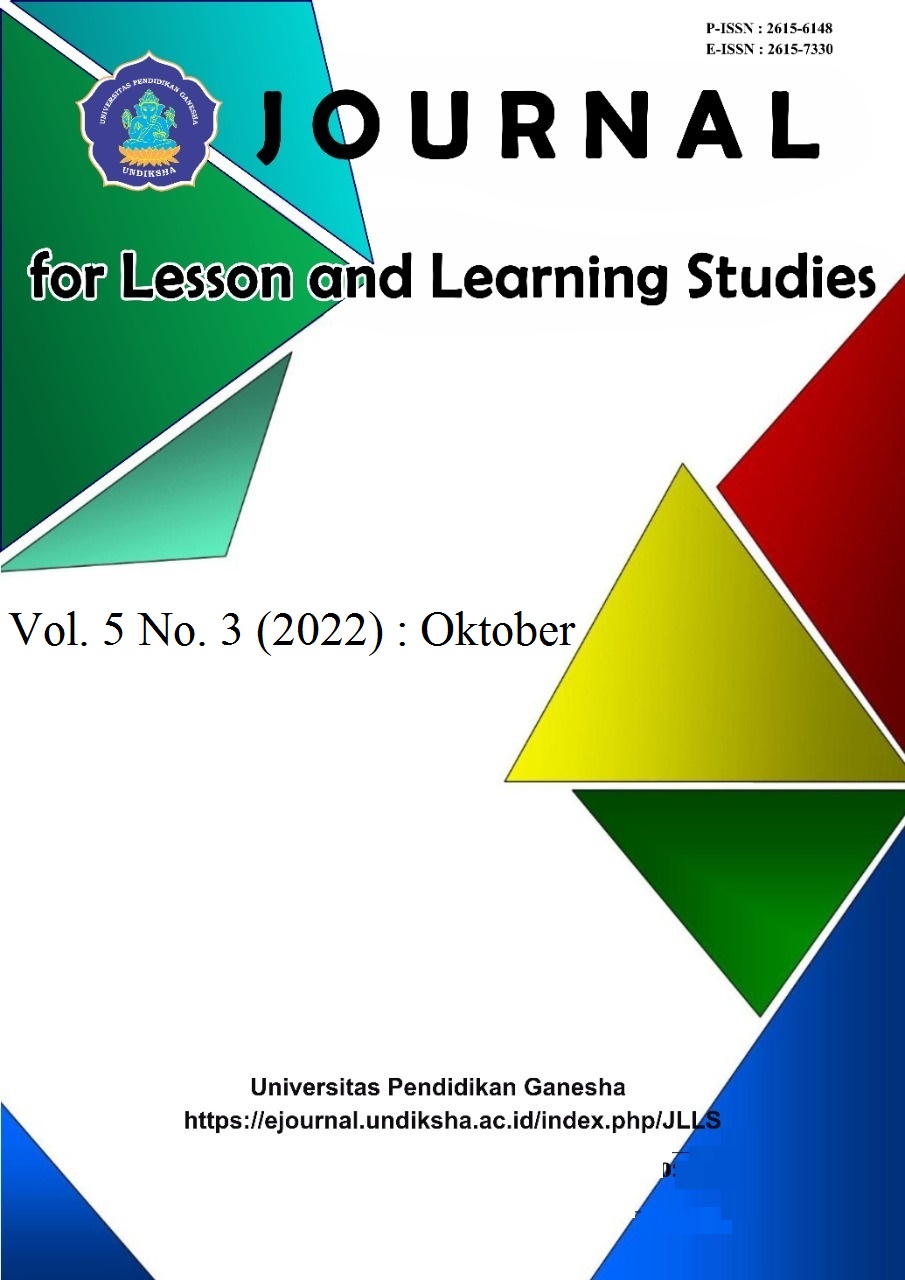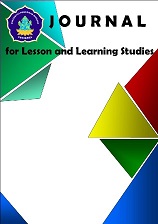Big Book Media in Early Reading Learning of First Grade Students
DOI:
https://doi.org/10.23887/jlls.v5i3.53641Kata Kunci:
Big book media, early reading learning, elementary schoolAbstrak
Curently students experience difficulties in reading at school, moreover there is no learning media used by teachers to support initial reading skills in the learning process in grade 1 due to limited facilities and infrastructure at school. The purpose of this study is to develop and find out the validity of the big book media in learning to read at the beginning of grade 1 elementary school. While the subjects in this study were 1 teacher, 2 students and 2 design aspects, 2 material aspects, and 2 language aspects. The methods used to collect data are observation, interviews, and questionnaires. The instruments used were validation sheets and interview sheets and the data analysis techniques used were quantitative and qualitative. The research results obtained are big book media on theme 1 sub-theme 1 for grade 1 elementary school students who are suitable for use based on the assessment of design experts with a percentage of 93.8% with valid criteria, linguists 94.4% with valid criteria and material experts with a percentage 86.3% with very valid criteria. The average percentage of validation results is 91.5% with a very valid category without revision.
Referensi
Arnold, S., & Reed, P. (2019). Measuring the word recognition abilities of children who are both verbal and nonverbal with ASD using a traditional paper-based and a novel digital test format. British Journal of Special Education. https://doi.org/10.1111/1467-8578.12279. DOI: https://doi.org/10.1111/1467-8578.12279
Astra, I. M., Raihanati, R., & Mujayanah, N. (2020). Development of Electronic Module Using Creative Problem-Solving Model Equipped with Hots Problems on The Kinetic Theory of Gases Material. Jurnal Penelitian & Pengembangan Pendidikan Fisika, 6(2), 181–194. https://doi.org/10.21009/1.06205. DOI: https://doi.org/10.21009/1.06205
Asyhari, A., & Silvia, H. (2016). Pengembangan Media Pembelajaran Berupa Buletin dalam Bentuk Buku Saku untuk Pembelajran IPA Terpadu. Jurnal Ilmiah Pendidikan Fisika Al-Biruni, 5(1), 1–13. https://doi.org/10.24042/jpifalbiruni.v5i1.100. DOI: https://doi.org/10.24042/jpifalbiruni.v5i1.100
Bobkina, J., & Stefanova, S. (2016). Literature and critical literacy pedagogy in the EFL classroom: Towards a model of teaching critical thinking skills. Studies in Second Language Learning and Teaching, 6(4), 677–696. https://doi.org/10.14746/ssllt.2016.6.4.6. DOI: https://doi.org/10.14746/ssllt.2016.6.4.6
Branch, R. M. (2010). Instructional design: The ADDIE approach. In Instructional Design: The ADDIE Approach. https://doi.org/10.1007/978-0-387-09506-6. DOI: https://doi.org/10.1007/978-0-387-09506-6
Cahyadi, R. A. H. (2019). Pengembangan Bahan Ajar Berbasis Addie Model. Halaqa: Islamic Education Journal, 3(1), 35–42. https://doi.org/10.21070/halaqa.v3i1.2124. DOI: https://doi.org/10.21070/halaqa.v3i1.2124
Creswell, J. W. (2013). Qualitative, Quantitative, and Mixed Methods Approaches: 4th edition. In Organizational Research Methods (Vol. 6, Issue 3). https://doi.org/10.1007/s13398-014-0173-7.2.
Elkordy, A. (2016). Development and implementation of digital badges for learning science, technologly, engineering and math (STEM) practices in secondary contexts: A pedagogical approach with empirical evidence. In Foundation of Digital Badges and Micro-Credentials: Demonstrating and Recognizing Knowledge and Competencies (pp. 483–508). Springer International Publishing. https://doi.org/10.1007/978-3-319-15425-1_27. DOI: https://doi.org/10.1007/978-3-319-15425-1_27
Fahrurrozi, Dewi, R. S., Kaban, S., Hasanah, U., Wardhani, P. A., & Rachmadtullah, R. (2020). Use of Whole Language – Based Initial Reading Asessment Modules in Early Grade Students : Study Efectiveness In Elementary School. International Journal of Advanced Science and Technology, 29(7), 946–953. https://www.researchgate.net/profile/Reza-Rachmadtullah/publication/340886930_Use_of_Whole_Language_-Based_Initial_Reading_Asessment_Modules_in_Early_Grade_Students_Study_Efectiveness_In_Elementary_School/links/5ea2ba4c458515ec3a02fb2b/Use-of-Whole-Langua.
Fansury, A. H., Januarty, R., Rahman, A. W., & Syawal. (2020). Digital Content for Millennial Generations: Teaching the English Foreign Language Learner on COVID-19 Pandemic. Journal of Southwest Jiaotong University, 55(3). https://doi.org/10.35741/issn.0258-2724.55.3.40. DOI: https://doi.org/10.35741/issn.0258-2724.55.3.40
Fitriani, D., Fajriah, H., & Rahmita, W. (2019). Big Book Learning Media in Developing Receptive Language Skills for Early Childhood. Journal of Obsession: Journal of Early Childhood Education, 4(1), 247. https://doi.org/10.31004/obsesi.v4i1.197. DOI: https://doi.org/10.31004/obsesi.v4i1.197
Gizatulina, D., Ismaeva, F., Solnyshkina, M., Martynova, E., & Yarmakeev, I. (2020). Fluctuations of text complexity: the case of Basic State Examination in English. SHS Web of Conferences, 88, 02001. https://doi.org/10.1051/shsconf/20208802001. DOI: https://doi.org/10.1051/shsconf/20208802001
Haryadi, R., & Selviani, F. (2021). Problematika Pembelajaran Daring Di Masa Pandemi Covid-19. Academy of Education Journal, 12(2), 254–261. https://doi.org/10.47200/aoej.v12i2.447. DOI: https://doi.org/10.47200/aoej.v12i2.447
Hayashi, P., Abib, G., & Hoppen, N. (2019). Validity in qualitative research: A processual approach. Qualitative Report, 24(1), 98–112. https://doi.org/10.46743/2160-3715/2019.3443. DOI: https://doi.org/10.46743/2160-3715/2019.3443
Hilda Hadian, L., Mochamad Hadad, S., & Marlina, I. (2018). Penggunaan Media Big Book Untuk Meningkatkan Keterampilan Membaca Kalimat Sederhana. Didaktik : Jurnal Ilmiah PGSD STKIP Subang, 4(2), 212–242. https://doi.org/10.36989/didaktik.v4i2.73. DOI: https://doi.org/10.36989/didaktik.v4i2.73
Istri Aryani, I. G. A., & Rahayuni, N. K. S. (2016). Innovation of Teaching and Learning English Applied to Animal Sciences’ Student with the Combination of Computer Media and Audio Visual. International Journal of Linguistics, Literature and Culture, 2(1). https://doi.org/10.21744/ijllc.v2i1.5. DOI: https://doi.org/10.21744/ijllc.v2i1.5
Jang, B. G., & Protacio, M. S. (2020). Use of Cognitive Interviews to Test the Validity of a Reading Motivation Instrument for English Learners. Reading Psychology, 1–21. https://doi.org/https://doi.org/10.1080/02702711.2020.1813226. DOI: https://doi.org/10.1080/02702711.2020.1813226
Karima, R., & Kurniawati, F. (2020). Kegiatan Literasi Awal Orang Tua pada Anak Usia Dini. Al-Athfal : Jurnal Pendidikan Anak, 6(1), 69–80. https://doi.org/10.14421/al-athfal.2020.61-06. DOI: https://doi.org/10.14421/al-athfal.2020.61-06
Kesumadewi, D. A., Agung, A. A. G., & Rati, N. W. (2020). Model Pembelajaran CIRC Berbantuan Media Cerita Bergambar Meningkatkan Hasil Belajar Bahasa Indonesia Siswa SD. MIMBAR PGSD Undiksha, 8(2), 303–314. https://doi.org/10.23887/jjpgsd.v8i2.25524.
Kholis, N., Kartowagiran, B., & Mardapi, D. (2020). Development and validation of an instrument to measure a performance of vocational high school. European Journal of Educational Research, 9(3), 955–966. https://doi.org/10.12973/EU-JER.9.3.955. DOI: https://doi.org/10.12973/eu-jer.9.3.955
Korat, O., Tourgeman, M., & Segal-Drori, O. (2021). E-book reading in kindergarten and story comprehension support. Reading and Writing, 0123456789. https://doi.org/10.1007/s11145-021-10175-0. DOI: https://doi.org/10.1007/s11145-021-10175-0
Liu, J., Guo, S., Gao, R., & DiStefano, C. (2020). Investigating school children’s behavioral and emotional problems using pediatric symptoms checklist-17 in a structural equation modeling framework. School Psychology International, 41(3), 257–275. https://doi.org/10.1177/0143034320912301. DOI: https://doi.org/10.1177/0143034320912301
Mahayanti, N. W. S., Artini, L. P., & Jannah, N. (2017). the Effect of Big Book As Media on Students’ Reading Comprehension At Fifth Grade of Elementary School in Sd Laboratorium Undiksha Singaraja. International Journal of Language and Literature, 1(3), 2549–4287. https://doi.org/10.23887/ijll.v1i3.12544. DOI: https://doi.org/10.23887/ijll.v1i3.12544
Manurung, A. M., Pardede, H., & Purba, C. N. (2020). The effect of using sustained silent reading ( SSR ) method to the students ’ ability in reading report text at the eleven grade of SMA Negeri 2 Pematangsiantar. Jetafl (Journal of English Teaching as a Foreign Language), 6(2), 39–65. http://ejournal.uhn.ac.id/index.php/jetafl/article/view/101.
Mardiana, E., & Hidayat, N. (2019). The Effect of Extensive Reading on Students’ Reading Achievement Of Senior High School. Kontribusia (Research Dissemination for Community Development), 2(2), 16. https://doi.org/10.30587/kontribusia.v2i2.1004. DOI: https://doi.org/10.30587/kontribusia.v2i2.1004
Mardiyanti, L., Hamdani Maula, L., Rizqia Amalia, A., Heryadi, D., & Ramdani, I. (2022). Upaya Peningkatan Kemampuan Membaca Pemahaman Menggunakan Media Big Book Sukuraga di Sekolah Dasar. Jurnal Basicedu, 6(4), 6387–6397. https://doi.org/10.31004/basicedu.v6i4.3227. DOI: https://doi.org/10.31004/basicedu.v6i4.3227
Marhaeni, A. A. I. N., Dantes, N., & Paramartha, A. A. G. Y. (2018). Teacher Assessment Literacy: Discrepancies in Authentic Assessment Practice in EFL Context. Proceeding Book of 1st International Conference on Educational Assessment and Policy, 2, 18–21. https://doi.org/10.26499/iceap.v2i1.90. DOI: https://doi.org/10.26499/iceap.v2i1.90
Maxwell, J. A., & Reybold, L. E. (2015). Qualitative Research. In International Encyclopedia of the Social & Behavioral Sciences: Second Edition. https://doi.org/10.1016/B978-0-08-097086-8.10558-6. DOI: https://doi.org/10.1016/B978-0-08-097086-8.10558-6
McLeod, S., Harrison, L. J., & Wang, C. (2019). A longitudinal population study of literacy and numeracy outcomes for children identified with speech, language, and communication needs in early childhood. Early Childhood Research Quarterly, 47, 507–517. https://doi.org/10.1016/j.ecresq.2018.07.004. DOI: https://doi.org/10.1016/j.ecresq.2018.07.004
Muruganantham, G. (2015). Developing of E-Content Package by Using ADDIE Model. International Journal of Applied Research, 1(3), 52–54. https://www.researchgate.net/profile/Muruganantham-Ganesan/publication/339102976_Developing_of_E-.content_pcakge_by_using_ADDIE_Model/links/5e3d6c4392851c7f7f249dc8/Developing-of-E-content-pcakge-by-using-ADDIE-Model.pdf.
Mutakinati, L., Anwari, I., & Yoshisuke, K. (2018). Analysis of students’ critical thinking skill of middle school through stem education project-based learning. Jurnal Pendidikan IPA Indonesia, 7(1), 54–65. https://doi.org/10.15294/jpii.v7i1.10495. DOI: https://doi.org/10.15294/jpii.v7i1.10495
Napratilora, M., Lisa, H., & Bangsawan, I. (2020). Using WhatsApp as a Learning Media in Teaching Reading. MITRA PGMI: Jurnal Kependidikan MI, 6(2), 116–125. https://doi.org/10.46963/mpgmi.v6i2.129. DOI: https://doi.org/10.46963/mpgmi.v6i2.129
Nurjanah, E., & Hakim, D. (2018). Pengembangan Bahan Ajar Materi Mencerna (Menyimak Cerita Anak) Berbasis Cerita Anak Majalah Bobo Pada Siswa Kelas VI MI Darun Najah 1 Jatirejo Mojokerto. Jurnal Bidang Pendidikan Dasar, 2(1), 69. https://doi.org/10.21067/jbpd.v2i1.2201. DOI: https://doi.org/10.21067/jbpd.v2i1.2201
Prawiyogi, A. G., Fitri, A., & Suhardiman, S. (2020). Use Of Big Book Media Towards Interest In Reading Elementary School Students. International Journal of Theory and Application in Elementary and Secondary School Education, 2(1), 8–11. https://doi.org/10.31098/ijtaese.v2i1.164. DOI: https://doi.org/10.31098/ijtaese.v2i1.164
Putra, R. W. P. (2021). Improving the Students’ Motivation in Learning English through Google Meet during the Online Learning. English Learning Innovation, 2(1), 35–42. https://doi.org/10.22219/englie.v2i1.14605. DOI: https://doi.org/10.22219/englie.v2i1.14605
Ramadanti, E., & Arifin, Z. (2021). Strategies to Improve Beginning Reading Skills through Picture Card Media for Early Childhood in the Islamic Frame and the Perspective of Educational Experts. Journal of Islamic Early Childhood Education, 4(2), 173–187. https://doi.org/10.24014/kjiece.v4i2.12245.
Risqi, E. N., & Rini Setianingsih. (2021). Statistical literacy of secondary school students in solving contextual problems taking into account the initial statistical ability. Mathematics Education Journal, 4(1), 43–54. https://doi.org/10.21067/pmej.v4i1.5285. DOI: https://doi.org/10.21067/pmej.v4i1.5285
Sa’idah Laily, dkk. (2019). Materials Development Of Beginning Reading Through Big Book Media For Students Grade II SD Negeri Percobaan Medan. International Journal of Research and Review, 6(7), 545–569. https://www.academia.edu/download/63584070/IJRR006620200610-112715-ax3usu.pdf.
Saefuddin, A., Malik, A., Maulidah, I. R., Chusni, M. M., Salahudin, A., & Carlian, Y. (2019). Students’ reading skills related to science learning using big book media. Journal of Physics: Conference Series, 1318(1). https://doi.org/10.1088/1742-6596/1318/1/012089. DOI: https://doi.org/10.1088/1742-6596/1318/1/012089
Setiyaningsih, G., & Syamsudin, A. (2019). Pengembangan Media Big Book Untuk Meningkatkan Kemampuan Literasi Anak Usia 5-6 Tahun. Scholaria: Jurnal Pendidikan Dan Kebudayaan, 9(1), 19–28. https://doi.org/10.24246/j.js.2019.v9.i1.p19-28. DOI: https://doi.org/10.24246/j.js.2019.v9.i1.p19-28
Setyorini, R., Saddhono, K., Ermanto, Wildan, M., & Kirom, S. (2019). The Effort of Implementing of the Big Book as A Media to Improve the Intelligence of Linguistic Verbals for Early Childhood. Journal of Physics: Conference Series, 1339(1). https://doi.org/10.1088/1742-6596/1339/1/012087. DOI: https://doi.org/10.1088/1742-6596/1339/1/012087
Sulaiman, U. (2017). Pengaruh penggunaan media big book dalam pembelajaran terhadap keterampilan literasi siswa kelas awal madrasah ibtidaiyah negeri Banta-Bantaeng Makassar. Jurnal Al-Kalam, IX(2), 193–204. https://journal3.uin-alauddin.ac.id/index.php/klm/article/view/4486.
Supriyadi, T., Julia, J., Aeni, A. N., & Sumarna, E. (2020). Action research in hadith literacy: A reflection of hadith learning in the digital age. International Journal of Learning, Teaching and Educational Research, 19(5), 99–124. https://doi.org/10.26803/ijlter.19.5.6. DOI: https://doi.org/10.26803/ijlter.19.5.6
Syakur, A., Fanani, Z., & Ahmadi, R. (2020). The Effectiveness of Reading English Learning Process Based on Blended Learning through “Absyak” Website Media in Higher Education. Budapest International Research and Critics in Linguistics and Education (BirLE) Journal, 3(2), 763–772. https://doi.org/10.33258/birle.v3i2.927. DOI: https://doi.org/10.33258/birle.v3i2.927
Tiro, M. A. (2018). National movement for statistical literacy in Indonesia: An idea. Journal of Physics: Conference Series, 1028(1). https://doi.org/10.1088/1742-6596/1028/1/012216. DOI: https://doi.org/10.1088/1742-6596/1028/1/012216
Vaismoradi, M., Jones, J., Turunen, H., & Snelgrove, S. (2016). Theme development in qualitative content analysis and thematic analysis. Journal of Nursing Education and Practice, 6(5). https://doi.org/10.5430/jnep.v6n5p100. DOI: https://doi.org/10.5430/jnep.v6n5p100
Widyaningrum, H. K., & Hasanudin, C. (2019). Kajian Kesulitan Belajar Membaca Menulis Permulaan (MMP) di Sekolah Dasar. Pedagogia : Jurnal Pendidikan, 8(2), 189–199. https://doi.org/10.21070/pedagogia.v8i2.2219. DOI: https://doi.org/10.21070/pedagogia.v8i2.2219
Unduhan
Diterbitkan
Cara Mengutip
Terbitan
Bagian
Lisensi
Hak Cipta (c) 2022 Linda Mardiyana, Febrina Dafit

Artikel ini berlisensiCreative Commons Attribution-ShareAlike 4.0 International License.
Authors who publish with the Journal for Lesson and Learning Studies agree to the following terms:
- Authors retain copyright and grant the journal the right of first publication with the work simultaneously licensed under a Creative Commons Attribution License (CC BY-SA 4.0) that allows others to share the work with an acknowledgment of the work's authorship and initial publication in this journal.
- Authors are able to enter into separate, additional contractual arrangements for the non-exclusive distribution of the journal's published version of the work (e.g., post it to an institutional repository or publish it in a book), with an acknowledgment of its initial publication in this journal.
- Authors are permitted and encouraged to post their work online (e.g., in institutional repositories or on their website) prior to and during the submission process, as it can lead to productive exchanges, as well as earlier and greater citation of published work. (See The Effect of Open Access)





